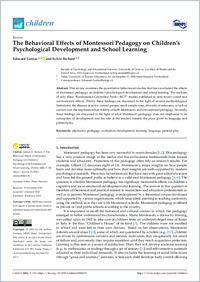The Behavioral Effects of Montessori Pedagogy on Children’s Psychological Development and School Learning
- Gentaz, Edouard ORCID Faculty of Psychology and Educational Sciences, University of Geneva
- Richard, Sylvie ORCID Valais University of Teacher Education
- 2022
Published in:
- Children. - This article belongs to the Special Issue Child Psychology: Typical and Atypical Development. - 2022, vol. 9, no. 2, p. 133
English
This review examines the quantitative behavioural studies that have evaluated the effects of Montessori pedagogy on children’s psychological development and school learning. The analyses of only three “Randomized Controlled Trials—RCT” studies published to date reveal varied and contradictory effects. Firstly, these findings are discussed in the light of several methodological limitations: the absence of active control groups, small sample sizes, diversity of measures, or lack of control over the implementation fidelity of both Montessori and conventional pedagogy. Secondly, these findings are discussed in the light of what Montessori pedagogy does not emphasise in its conception of development and the role of the teacher, namely the place given to language and pretend play.
- Language
-
- English
- Classification
- Education, teaching
- License
- Open access status
- gold
- Identifiers
-
- ISSN 2227-9067
- DOI 10.3390/children9020133
- Persistent URL
- https://fredi.hepvs.ch/hepvs/documents/328087
Statistics
Document views: 81
File downloads:
- Gentaz_Edouard_Children_2022_9 _BehavioralEffectsMontessoriPedagogy: 213
